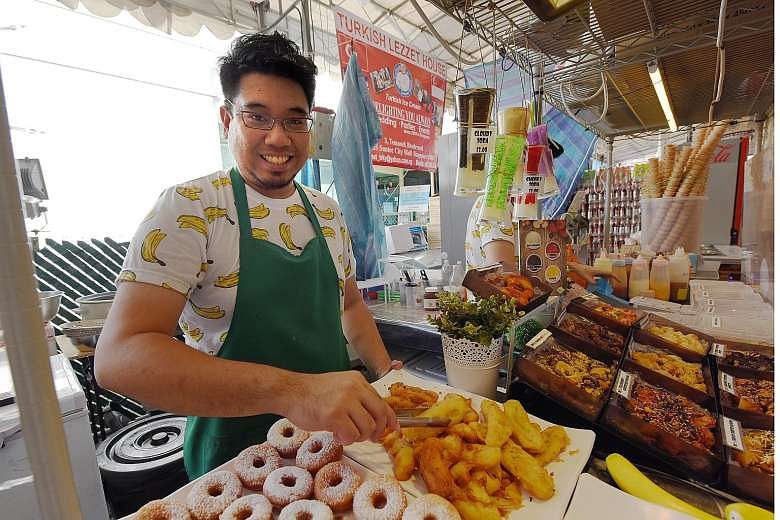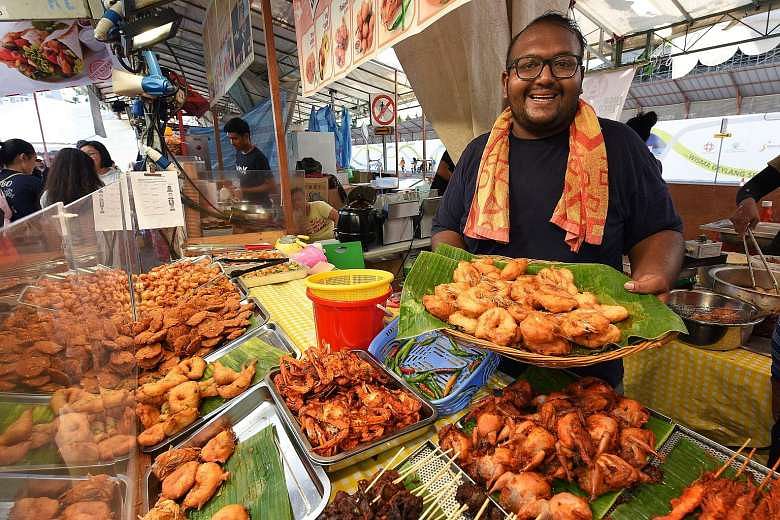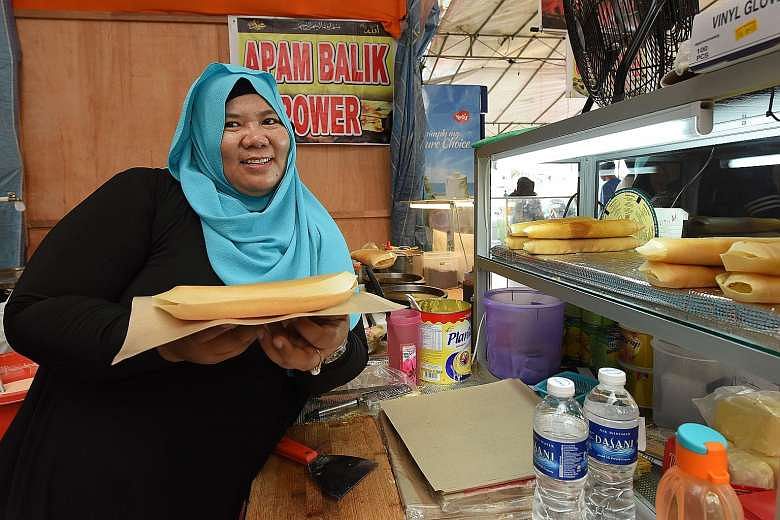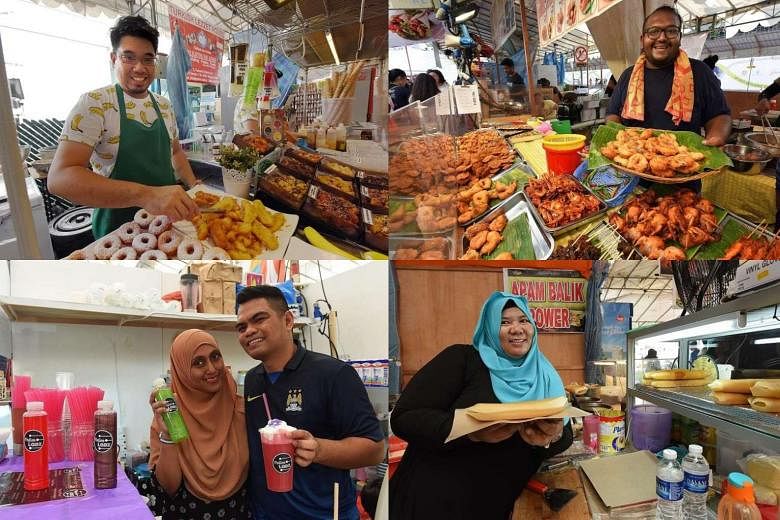In the past, there were stalls selling baju kurung or songkoks, vases, satay or, simply, coconut leaves used to wrap ketupat (rice cakes).
But stalls selling traditional fare that once lined Geylang Serai in the lead-up to Hari Raya Puasa are dwindling or have vanished altogether.
In their place are myriad food stalls, as colourful in name as they are in appearance. Many are run by young people who have given Malay and Indian food a modern twist, or offer creations that could have sprung from a fairy tale.
An example is unicorn milkshake - a pink drink topped with whipped cream, rainbow sprinkles, candy and a unicorn-shaped meringue.
LOOKING FOR NOVELTY
For over 40 years, the annual bazaar has attracted throngs of people during the fasting month of Ramadan, to buy food for dinner or items to prepare for the festivities.
But, in recent years, the crowds are demanding something else.
While the usual favourites like Ramly Burger are still popular, stalls offering unusual items such as rainbow burgers, baby potatoes and chicken cocktail sausages slathered with melted cheese are the ones that draw the crowds.
The Sunday Times visited the bazaar last week and found that business is slow for those selling traditional food like kek gulung pelangi (swiss rolls) or apam balik (pancakes with peanut and sugar).
Madam Judy Tan, 62, who sells kek gulung pelangi, said business has been dropping steadily over the years. This year's sales so far have been only half of what she made last year in the first two weeks. She said: "No one wants such old- fashioned food, only my regular customers."
Even harder hit are stalls which are not offering food, including those selling clothes, fabric, carpets and shoes.
A traditional Malay clothing seller, who wanted to be known only as Mr Yeong, said he had not managed to cover even half of the $7,000 rental of the stall. "People who want clothes for festive occasions can easily buy them online or at many other shops all year round," he said.
By 6pm that day, Mr Yeong, 61, had served only two customers.
TRADITIONAL YET DIFFERENT
Some food stall hawkers are determined not to become redundant. Apart from offering their signature traditional items, they have added modern variations to the menu.
For example, when The Original Recipe opened 30 years ago, it sold only prawn vadai (savoury Indian doughnuts). Today, its menu includes cheese vadai, chocolate vadai and chicken skewers.
Second-generation owner Suri- yah Selvarajah, 28, said: "Older people like vadai but the younger ones like hipster food. I need to attract them or else I'm not going to survive in this market."
Another such hawker is Mr Abdul Hakeem Ibrahim, 30, who runs O'Braim with his siblings. They sell goreng pisang in different flavours. Their top-seller is flavoured with chocolate-cheese and condensed milk. They sell 450 to 500 boxes a day. Other flavours include nutella and milo with chocolate balls, and strawberry cheesecake.
Mr Hakeem said: "Many stalls sell the same things. You have to be different to survive. We have sold traditional items like curry puffs, but they don't go as fast as bananas."
TOO MODERN?
Some older customers said they miss the old bazaars. Housewife Mariam Hassan, 60, also said she finds the new offerings too sweet.
Housewife Sim Pok Gek, 70, prefers more traditional offerings like satay and otah, and she misses the clothing shops. But, she said, change is also nice. "I find it fun to walk around and see new things."
Others said they enjoy the festive mood and mingling with the crowds.
Student Nadzirul Amzar, 21, said more people from other races are visiting the bazaar because of the modern food offerings. He added: "The good thing is, the target market has increased."
Ms Nidya Ghazali, 19, also a student, said: "It's a good opportunity to try out hipster food once a year. I especially like sushi burrito."
Goreng pisang with a modern twist

O'Braim entered the pasar malam circuit a year ago selling goreng pisang (banana fritters) with a modern twist. Run by Mr Abdul Hakeem Ibrahim, 30, his brother, sister and brother-in-law, it is an example of how traditional snacks are being reinvented to keep up with changing tastes. They sell banana fritters in different flavours, including chocolate and cheese with condensed milk, and strawberry cheesecake, while using a goreng pisang recipe passed down from their grandmother.
Mr Hakeem said they have been testing out a new flavour at each Pasar Malam they go to. "If it is a hit, we will keep it on the menu," he said.
His parents also run a stall selling traditional Malay food such as nasi padang, as well as snacks like curry puff and popiah, at Pasir Ris West Plaza.
Hot favourite year after year

The Original Recipe has, for 30 years, sold its signature prawn vadai at the annual Geylang Serai Bazaar. Started by Madam Jamuna Rani, 60, and her late husband, the business was passed on to their son Suriyah Selvarajah, 28, eight years ago.
Madam Rani said she uses her mother's vadai recipe, which she has slightly modified over the years. Each day, she starts the four-hour preparation at 5am, chopping up 5kg worth of onion, these days with a help of a machine. She also makes the vadai dough and marinate the meat.
Since Mr Suriyah joined the business, the menu has expanded to include varieties like cheese and chocolate vadai, and food items like chicken skewers. "The bazaar has been a part of my life since I was in kindergarten. It is very close to my heart," he said.
Hipster treats a 'touch of magic'

An opportunity for all siblings to get together is the reason behind setting up Potion Labz, a family-run stall selling doughnut ice cream and milkshakes.
Ms Nur Nishah, 33, said that she and her siblings "wanted to try out something different by selling hipster food". They sell drinks in vibrant colours which they call magical pop, and doughnuts with colourful ice cream and marshmallows, which they call magical doughnuts. At the same time, they blend in traditional flavours into their drinks, such as gula melaka milkshake, to entice the more traditional customers.
Potion Labz reaches out to the younger crowd by tapping on social media. Ms Nur Nishah said business has been brisk, with hundreds of doughnut ice cream and milkshakes sold a week.
$3.50 for a pancake since 2011

A permanent fixture at the bazaar since 2011, Madam Rozaelfita Ali Amran has been keeping the price of her apam balik constant at $3.50 for a whole pancake. "I cannot raise the price lah, or my customers will run away!" the cheery 42-year-old stall owner of Apam Balik Power said. Her preparation starts at 11am daily, and she sells her signature pancakes from noon, closing only at midnight. She said she sells up to 200 pancakes on weekdays, and when there are more people on weekends, she can sell up to 350 pancakes.
Alternating between putting pancake batter on the pan and collecting payment from her customers, she lamented that the bazaar is increasingly less traditional, with the introduction of stalls selling hipster food products. "No good... must cater more to the Malays. After all, this is a Ramadan bazaar."


